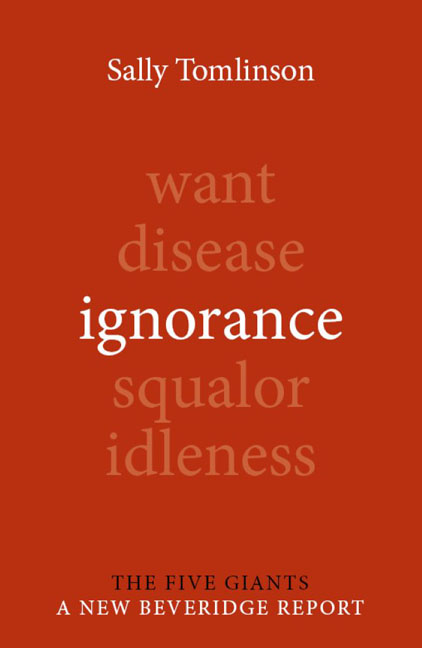Book contents
- Frontmatter
- Contents
- Preface
- 1 Introduction: Ignorance Evolves
- 2 Breaking Out of Ignorance, 1945–80
- 3 Market Forces and Ignorance in the 1980s
- 4 Redistributing Ignorance in the 1990s
- 5 Bog-Standard Schools and Academies, 2000–10
- 6 Weirdos and Misfits, 2010–20
- 7 Ignorance in Covid/Post-Covid Schooling, 2020–21
- 8 Conclusion
- References
- Index
1 - Introduction: Ignorance Evolves
Published online by Cambridge University Press: 20 January 2024
- Frontmatter
- Contents
- Preface
- 1 Introduction: Ignorance Evolves
- 2 Breaking Out of Ignorance, 1945–80
- 3 Market Forces and Ignorance in the 1980s
- 4 Redistributing Ignorance in the 1990s
- 5 Bog-Standard Schools and Academies, 2000–10
- 6 Weirdos and Misfits, 2010–20
- 7 Ignorance in Covid/Post-Covid Schooling, 2020–21
- 8 Conclusion
- References
- Index
Summary
If you think education is expensive, try ignorance.
Car sticker from the mid-1980s after cuts to education spending
Never forget the past, you may need it again in the future.
Malcolm Bradbury, Dr Criminale, 133
I am four years old and sitting on the steps outside a school and crying to be let in. My brother, older than me, is inside the two-room school in the village to which we were evacuated in the Second World War as the bombs began to fall on Manchester. I don't know it yet, but I want many different kinds of knowledge. I want to know about the letters and words on the bright posters around the schoolroom walls. I want to be able to paint and crayon and sing with the other children. I want to run around the small playground and play new games. In short, I want the “cultural, mental and physical development” that the national curriculum of 1988 announced would provide me with a broad and balanced education, along with spiritual and moral development. As it was a Church of England school, I would have got those anyway once the church and state had been reconciled in the 1944 Education Act, and later on in the Catholic convent school I was sent to, where we had a lesson on “manners and morals” every Friday.
But I would also be introduced to various kinds of ignorance. I wouldn't learn until much later that letters and words could be in other languages. I wouldn't realize that some of the “truths” I learned about Britain, its history and geography, even stories and poetry, would be lies or misinformation. I wouldn't learn that there were other religions or ethnicities until my teenage years. I didn't know I was being introduced to the acceptance of a social class hierarchy when we sang a hymn, “All things bright and beautiful”, which included the verse, “The rich man in his castle, the poor man at his gate, God made them high and lowly and ordered their estate”. I was yet to learn that being a girl would limit my future. I didn't know that my excited need to know about the world around me would soon be narrowed into joyless rote learning and practising for something called tests, and a thing we learned to dread called the 11-plus examination.
- Type
- Chapter
- Information
- Ignorance , pp. 1 - 28Publisher: Agenda PublishingPrint publication year: 2022

